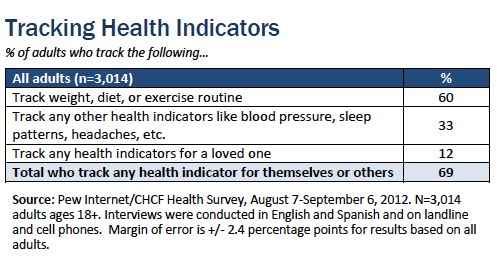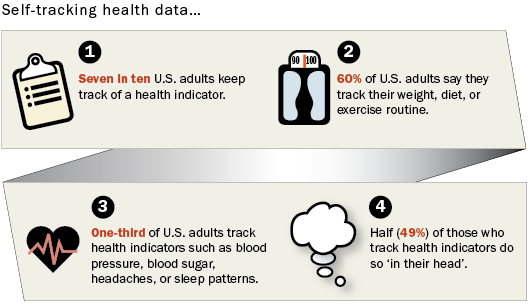Seven in ten U.S. adults track a health indicator for themselves or for a loved one
Keeping notes on one’s health has been shown to be a tool for improving it,1 but up until now there has been no measure of how many people engage in this activity.
A national telephone survey conducted by the Pew Research Center’s Internet & American Life Project finds that 69% of U.S. adults keep track of at least one health indicator such as weight, diet, exercise routine, or symptom.

We will refer to this group as “trackers” throughout this report.
People living with chronic conditions are significantly more likely to track a health indicator or symptom
The Pew Internet survey shows that people living with one or more chronic conditions are no more likely than other U.S. adults to track their weight, diet, or exercise routine. They are, however, significantly more likely to track other health indicators or symptoms and this likelihood increases among those living with more than one condition:
- 19% of U.S. adults reporting no chronic conditions say they track health indicators or symptoms
- 40% of U.S. adults with 1 condition are trackers
- 62% of U.S. adults with 2+ conditions are trackers
Nearly half (45%) of U.S. adults are dealing with at least one chronic condition. Of those who are living with two or more conditions, 78% have high blood pressure and 45% have diabetes — two health conditions more effectively managed when people track their own data.2
Tracking on paper, spreadsheet, mobile device — or just “in their heads”
Since some people track more than one aspect of their health we asked respondents to think about the health indicator they pay the most attention to, either for themselves or someone else, and to tell us how they track it:
- 49% of trackers say they keep track of progress “in their heads.”
- 34% say they track the data on paper, like in a notebook or journal.
- 21% say they use some form of technology to track their health data.
(Total may exceed 100% due to multiple responses.)
There were significant differences between the 50% of trackers who record their notes in some organized way, such as on paper or using technology, and the 44% of trackers who keep track solely “in their heads.” We will note the differences in each section that follows.
People with more serious health concerns take their tracking more seriously
Trackers living with multiple chronic conditions are more likely to be methodical about collecting their own health data:
- 45% of trackers with 2+ conditions use paper, like a notebook or journal, compared with 37% of trackers with 1 condition and 28% of trackers who report no chronic conditions.
- 22% of trackers with 2+ conditions say they use a medical device, like a glucometer, compared with 7% of trackers with 1 condition and 2% of trackers who report no chronic conditions.
At the same time, many trackers living with chronic conditions say they keep the data “in their heads.” Thirty-seven percent of trackers with 2+ conditions say they keep their progress notes “in their heads,” as do 48% of trackers with 1 condition and 54% of trackers who report no chronic conditions.
Half of all trackers update their records or notes only occasionally and most do not share the data with anyone else
Half of trackers (49%) say they update their records or notes only occasionally, when something comes up or changes; half (46%) say they update on a regular basis. Thirty-four percent of trackers say they share their records or notes with another person or group, either online or offline. Of those, half (52%) share with a clinician.
Not surprisingly, trackers who do not take formal notes are less likely than others to say they update their records on a regular basis or to share their progress with someone else.
Trackers with two or more conditions are more likely than other groups to say they keep track on a regular basis (rather than just when something comes up) and they are more likely to share their notes with someone else:
- 54% of trackers with 2+ conditions update their notes on a regular basis, compared with 46% of trackers with 1 condition and 43% of trackers who report no chronic conditions.
- 43% of trackers with 2+ conditions share their notes; of those, 71% share with a clinician
- By comparison, 35% of trackers with 1 condition share their notes; of those, 57% share with a clinician. Thirty percent of trackers who report no chronic conditions share their notes; of those, 37% share with a clinician.
Tracking can affect someone’s overall approach to health
Why do people go to the trouble of tracking health data, for themselves or for someone they care for? Some say they get results:
- 46% of trackers say that this activity has changed their overall approach to maintaining their health or the health of someone for whom they provide care.
- 40% of trackers say it has led them to ask a doctor new questions or to get a second opinion from another doctor.
- 34% of trackers say it has affected a decision about how to treat an illness or condition.
In all, 63% of trackers agree with at least one of those statements of impact.
Tracking has had a more significant impact on people living with chronic conditions
Trackers with chronic conditions are significantly more likely to report that these activities have had an impact on their health:
- 56% of trackers living with 2+ conditions say it has affected their overall approach to maintaining their health or the health of someone they help care for, compared with 40% of trackers who report no chronic conditions.
- 53% of trackers living with 2+ conditions say it has led them to ask a doctor new questions or to seek a second opinion, compared with 33% of trackers with no chronic conditions
- 45% of trackers living with 2+ conditions say it has affected a decision about how to treat an illness or condition, compared with 25% of trackers with no chronic conditions.
Three-quarters of trackers with 2+ conditions (76%) agree with at least one of those statements – only 24% say that tracking a health indicator hasn’t affected their health in any of these ways. Fully 68% of trackers with 1 condition report at least one of the three impacts, compared with 55% of those who report no chronic conditions.
Caregivers and trackers who had experienced a recent, significant health change are also more likely than other groups to report an impact. Trackers who keep formal records, such as on paper or using technology, are also more likely than others to report an impact.

About this study
The results reported here come from a nationwide survey of 3,014 adults living in the United States. Telephone interviews were conducted by landline (1,808) and cell phone (1,206, including 624 without a landline phone). The survey was conducted by Princeton Survey Research Associates International. Interviews were done in English and Spanish by Princeton Data Source from August 7 to September 6, 2012. Statistical results are weighted to correct known demographic discrepancies. The margin of sampling error for the complete set of weighted data is ±2.4 percentage points.
The Pew Internet & American Life Project is an initiative of the Pew Research Center, a nonprofit “fact tank” that provides information on the issues, attitudes and trends shaping America and the world. The Project is nonpartisan and takes no position on policy issues. Support for the Project is provided by the Pew Charitable Trusts.
Support for this study was provided by the California HealthCare Foundation, an independent philanthropy committed to improving the way health care is delivered and financed in California.




